In this article:
Every human has an innate need to protect their baby. It is no surprise then that any kind of harm to your children can make you feel troubled and worried.
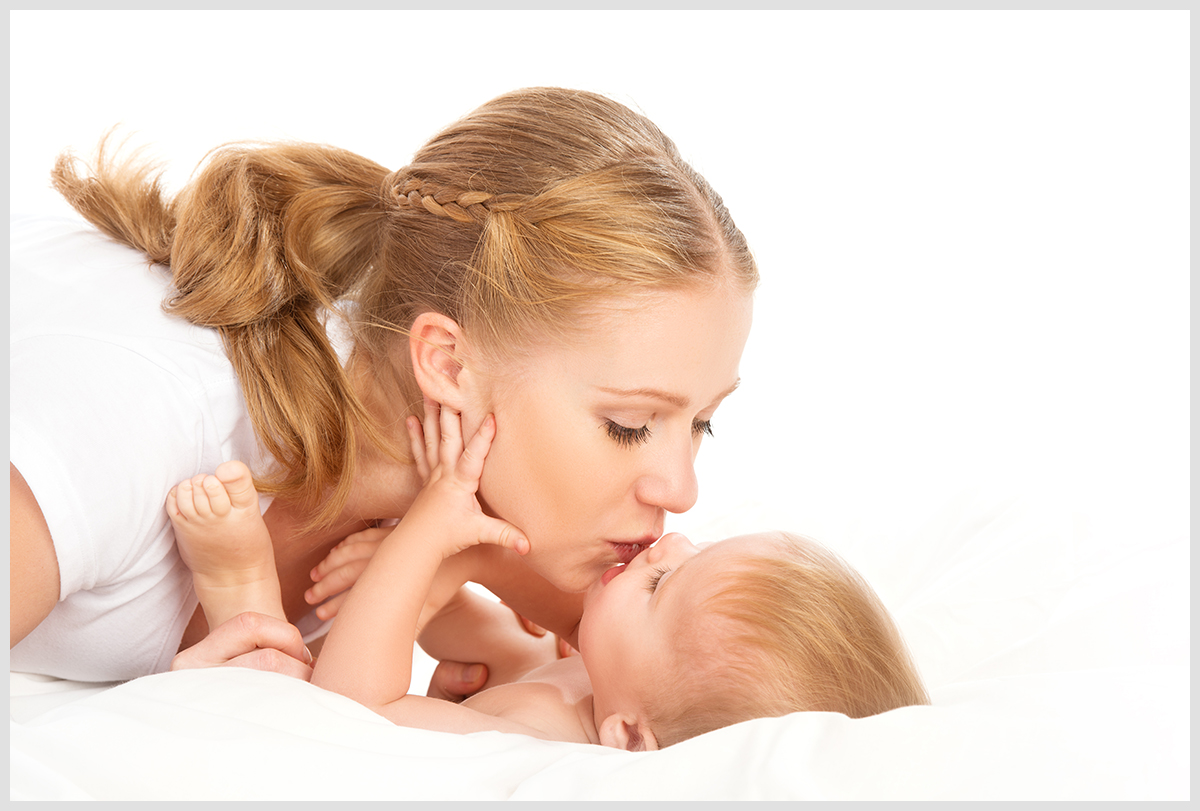
Even a small issue with your baby can lead to sleepless nights because you cannot bear to see them suffer or be in pain. Also, the smallest symptoms that your baby shows can make you think of the worst and you try your best to make them feel better.
It is also very natural that when you see a baby playing, your heart fills with love and adoration. It makes you want to play with their little arms and tiny hands or squeeze their chubby cheeks.
All of these responses are fair and good. However, some people have a habit of kissing infants and babies on the lips as a sign of affection, which is bad for the little ones.
People fail to realize that any mouth-to-mouth contact can expose the little child to various diseases and illnesses that can be easily avoided.
Don’t Let Anyone Kiss Your Baby on the Lips
Kissing a baby on the lips can put them at risk of various infections and illnesses, which include the following:
1. Herpes simplex virus
One of the most common issues that arise from mouth-to-mouth contact is herpes simplex virus infection, which is also known as HSV1. (1)
A herpes simplex virus infection is a communicable disease that is highly contagious and also pretty common around the world. It affects your mouth and parts of your face and leads to the appearance of sores on your mouth and lips accompanied by a feeling of burning sensation around the mouth.
It is pretty evident that any kind of mouth-to-mouth contact, especially with infants, can expose them to this viral disease.
Before the appearance of symptoms, the virus is already present in the person’s body and hence can be transferred to another person even when the infected person is asymptomatic. Therefore, you must not allow even a healthy person to kiss your child on the lips because they may be asymptomatic but very well still be carriers of infections and diseases. (2)
According to a statistical analysis shared by the World Health Organization, more than 50% of adults under the age of 50 suffer from a herpes simplex virus infection. (3)
The worrisome and serious issue with herpes simplex virus is that the symptoms occur much later after the disease has often become untreatable and immensely complicated. This is why you have to take every precautionary measure to ensure that your child does not come in contact with this virus through an adult or another child. (4)
Management
- Oral or parenteral antiviral drugs
- Supportive therapy – IV fluids
- Respiratory support
2. Respiratory syncytial virus
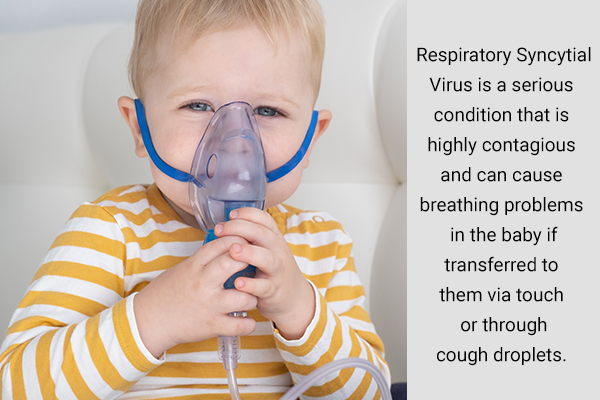
A respiratory syncytial virus infection is a serious condition that is highly contagious and can cause breathing problems in the baby if transferred to them via touch or through cough droplets. It can further lead to serious complications such as bronchiolitis and pneumonia.
This infection starts with a runny nose and congestion, which can later cause wheezing, fever, and rattling in the chest. (5)
Management
- Over-the-counter medicines to manage the symptoms
- Ensuring your child is drinking enough fluids
- Breathing support, if required
- Avoiding giving aspirin to children
3. Hand, foot, and mouth disease
Hand, foot, and mouth disease is a viral disease that causes ulcers and rashes and can be very problematic for babies who still have developing or weak immune systems. The mild symptoms may last for around a week.
The condition is most common in babies under the age of 5. It can cause loss of appetite, headache, irritability, and malaise. (6)
Management
- Ensuring your child is drinking enough fluids
- Over-the-counter medicines for symptomatic relief
- Avoiding giving aspirin to children
- Offering soft foods that are easier to swallow
4. Allergic reactions
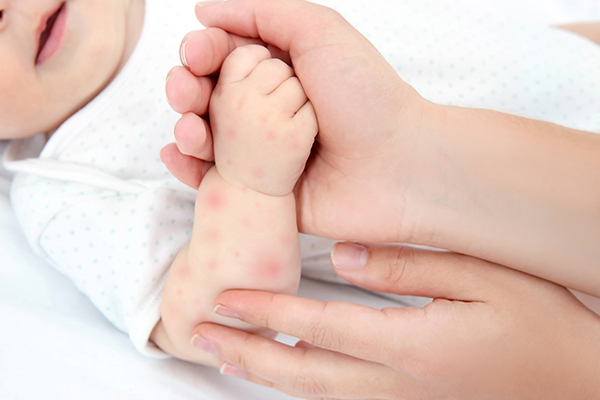
If your baby has allergies to food or compounds found in cosmetics or skin care products, then they can suffer from allergic reactions if someone kisses them on the mouth after eating a certain food or using a certain skin care product. (7)
Management
- Antihistamines for symptomatic relief
- Immediately contacting the doctor if symptoms worsen
- Topical medication for skin issues
5. Other symptoms to look out for
Additional signs and symptoms that you should be watchful of include: (8)
- Recurring fever
- Sore throat
- Difficulty breathing
- Vomiting
- Diarrhea
- Trouble breastfeeding
- Crying for long durations without stopping
- Irritability
- Seizures
- Rashes
- Sudden weight loss
- Blisters
- Decreased urination
Precautions to Protect Your Child From Diseases
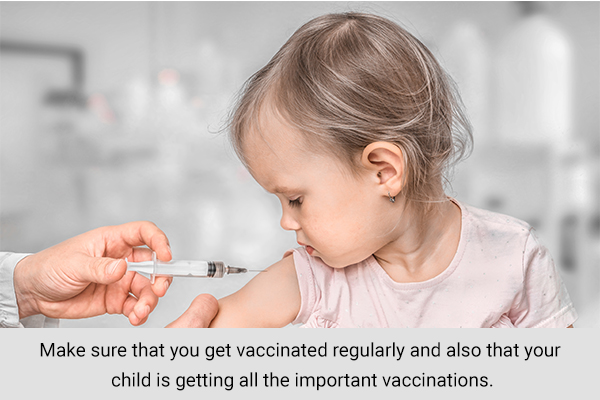
Here are very simple things that you can do as precautionary measures to keep your child safe from infections and illnesses:
- Get vaccinated regularly and make sure that your child is getting all the important vaccinations.
- Before you hold your baby, wash your hands and encourage others to do the same.
- If someone suffers from a contagious disorder or any infection, ask them to maintain a safe distance from your child.
- Give your baby a bath frequently.
- Use fresh wipes and diapers for your baby.
Most-Asked Questions
What are the common symptoms of a herpes simplex virus infection?
If you suspect that your baby might be suffering from a herpes simplex virus infection or has come in contact with someone who was later diagnosed with the same, you can look for the following symptoms:
- Fever
- Irritation
- Burning sensation around the mouth
- Baby being unable to breastfeed
- Baby cries during breastfeeding
- Redness in the gums
- Swelling of the lymph nodes
- Sores around the lips
- Sores inside the mouth
- Itching around the lips
What happens if my child suffers from a herpes simplex virus infection?
The problem with the herpes simplex virus is that it can spread to other parts of the body, which can include the brain, liver, and stomach. This then causes damage to body organs, which is often very serious and cannot be treated. The damage is usually done way before the symptoms occur.
So, although the symptoms of the infection are not fatal or life threatening, they are in fact a sign of a serious infection in the body.
Herpes simplex viruses pave the way for other conditions such as nervous system disorders, visceral diseases, and sometimes even hepatitis. This is why this infection is very fatal, especially in babies under the age of 3 months. (9)
What precautionary measures can I take to protect my baby from infections?
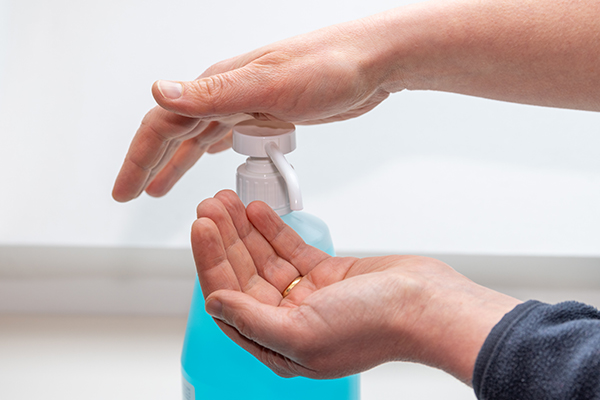
Prevention is always better than cure. Here are some things you can do to safeguard your child from infections:
- Guard your baby so that no one makes mouth-to-mouth contact with them.
- Say no to anyone who wants to kiss your baby on the lips. So you do not come out as arrogant, explain to the person why it is not a good idea for them to kiss the child and the possible infections and serious complications that your child may get.
- Prioritize your child’s safety, health, and well-being.
- It is also a good practice that before someone holds your baby, they wash their hands or at least use sanitizer to disinfect them. It can be an extra effort but it is always worth protecting your child from deadly infections.
Is it okay for parents to kiss their babies on the lips?
To prevent the spread of infections or serious health issues to kids, the rule of not kissing babies on the lips applies to everyone, including the parents.
What should I do if someone kissed my newborn?
There’s not much a person can do to stop the spread of disease if an infected person comes too close to the child. The best you can do is to wash the kissed area with a gentle cleanser and water.
Final Word
Your baby is at its most vulnerable state in the first few months of their life. It is important that you take all the precautionary steps necessary to maintain a safe environment for your child, including guiding adults so that they are not unnecessarily touching or kissing your baby, especially on the mouth.
Maintaining hygiene both for yourself and your child is another very important step that you can take.
- Was this article helpful?
- YES, THANKS!NOT REALLY


